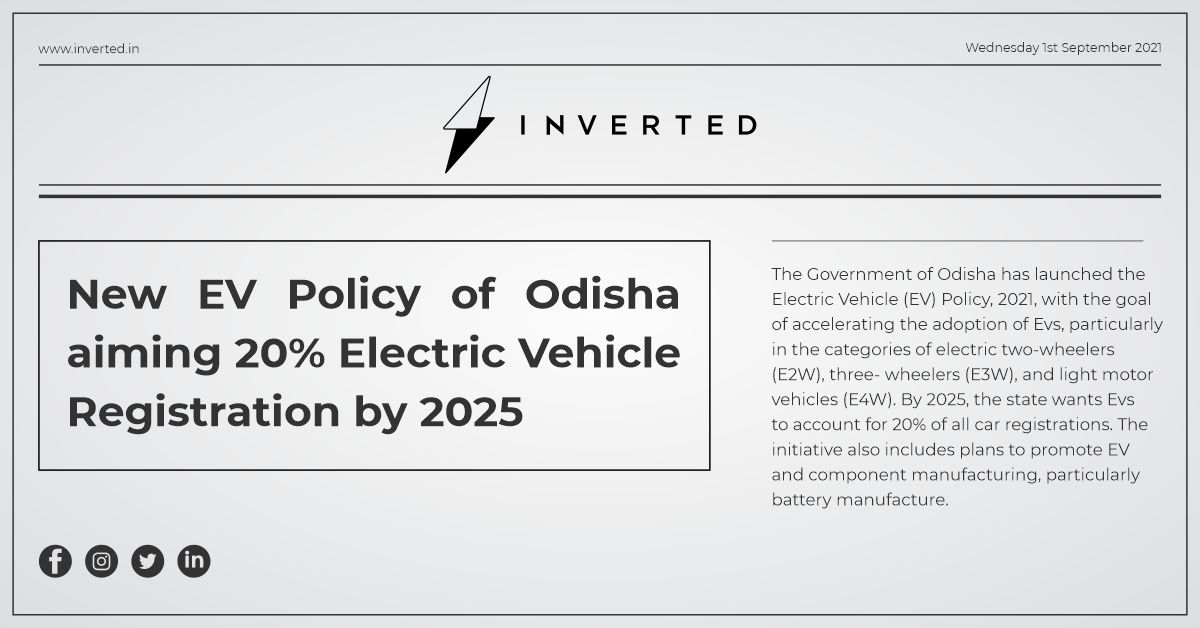
The Government of Odisha has launched the Electric Vehicle (EV) Policy, 2021, with the goal of accelerating the adoption of EVs, particularly in the categories of electric two-wheelers (E2W), three-wheelers (E3W), and light motor vehicles (E4W). By 2025, the state wants EVs to account for 20% of all car registrations. The initiative also includes plans to promote EV and component manufacturing, particularly battery manufacture.
This policy will be valid for 5 years.
Financial incentives for EV manufacturing, purchasing, and discarding are proposed in the policy. Interest on loans will be subsidized, as well as road tax and registration fee waivers. Start-ups will also be eligible for incentives.
Demand incentives for EVs
The policy encourages the purchase and use of electric vehicles, notably in the E2W, E3W, and E4W sectors. Incentives would be available for vehicles authorized under the Faster Adoption and Manufacturing of Electric Vehicles in India Phase-II (FAME II) program.
The state govt will provide a 15% subsidy to the consumers who will be purchasing E2W, E3W, and E4W.
- A maximum subsidy of ₹ 5000 to E2W
- A maximum subsidy of ₹ 12,000 to E3W
- A maximum subsidy of ₹ 1,00,000 to E4W
E-buses will receive a subsidy of 10% up to a maximum of ₹2,000,000. A purchase incentive of ₹30,000 will be provided to the first 5,000 electric goods carriers registered in the State.
SGST on the sale of e-buses and e-goods carriages sold and registered in the state throughout the policy’s lifetime would be fully repaid. E-buses and e-goods carriages will be exempt from road tax and registration fees for five and four years, respectively.
Employees would also be eligible for a 100 percent interest-free loan to acquire electric vehicles from the government. Similarly, hiring and purchasing electric vehicles for official use would be prioritized by government agencies, offices, and public sector organizations.
A public interest subsidy will be available for the purchase of electric vehicles for personal usage.
Municipalities will subsidize parking for all personal electric vehicles. Towns and localities will develop city parking strategies to encourage on-street charging stations and subsidized parking spaces for electric vehicles.
Original Equipment Manufacturers (OEMs) will be required to register their e-vehicle models with the Transportation Department, including swappable battery models that meet eligibility standards.
Supply incentives for EVs
Incentives will be provided to make the state more suitable for the establishment of EV manufacturing and R&D facilities including component manufacturing, vehicle assembly, battery assembly, cell manufacturing, electronics parts manufacturing, recycling of EVs, and EV batteries.
The policy outlines the following incentives:
- New micro & small enterprises (MSEs) would receive financial assistance up to 25% of capital investment made in plant and machinery subject to an upper limit of ₹10 million.
- New MSEs owned by scheduled caste/scheduled tribe/differently-abled/women/technical and diploma holders would receive financial assistance of 30% of capital investment made in plant and machinery subject to a ceiling of ₹12.5 million.
- New MSEs set up in industrially backward districts, including the Kalahandi Balangir Koraput region, would receive an additional capital investment subsidy of 5%.
The State government will also explore the possibility of entering into a memorandum of understanding with lithium cell manufacturers to start a battery assembly plant in Odisha.
Incentives Against the Charging Infrastructure
For the first 20,000 private charging stations, the Odisha government would provide a grant of up to 5,000 rupees to purchase charging equipment.
Energy companies will be invited to set up charging and battery switching stations throughout the country, as well as along major routes. For the charger installation costs, the government would pay a capital subsidy of 25% to the selected energy operators. The subsidy will be accessible within a year of the areas being assigned.
The first 500 electric vehicle charging stations would receive a special subsidy.
The government would also pay energy operators for the acquisition of batteries for swapping stations at a 100% SGST rate.
The nodal agency for putting up and monitoring charging stations would be the Office of the Engineer-in-Chief, Electricity.
The government will ensure that the batteries currently installed in electric vehicles are prominently identified with the battery chemistry used. It will be investigated whether there are any synergies with existing e-waste management agencies.
In collaboration with the Forest & Environment Department and the State Pollution Control Board, the Industries Department will introduce a well-defined policy to encourage recyclers.


Leave A Comment